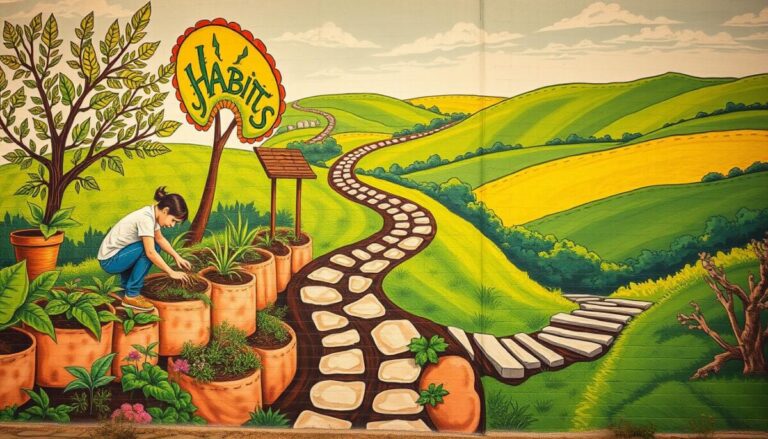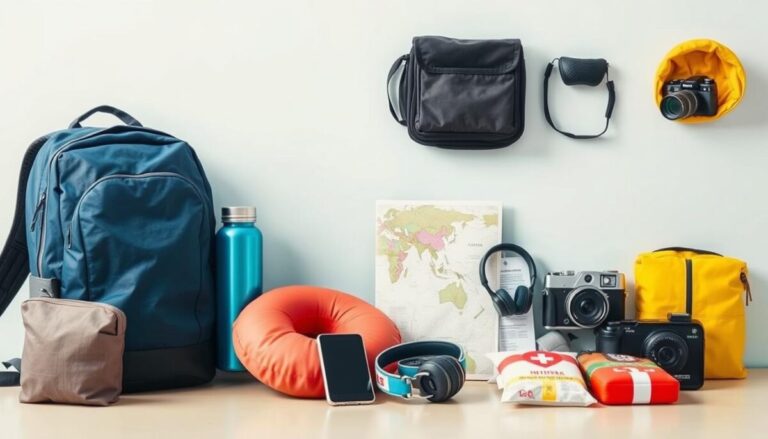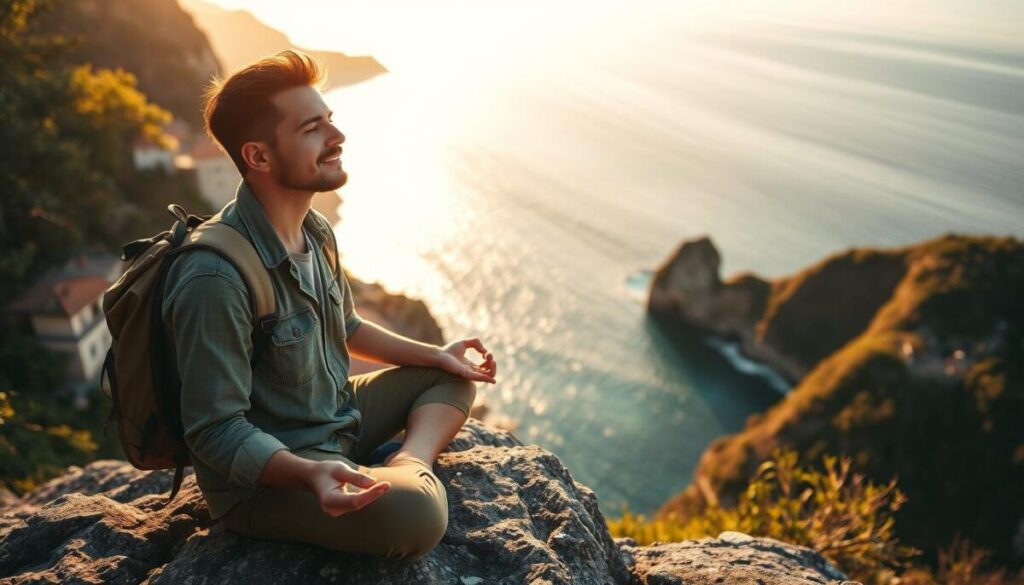
Ever wondered why seasoned travelers always recommend taking at least one trip alone? Solo travel isn’t just about visiting new places—it’s about uncovering a stronger, more independent version of yourself.
As you navigate through unfamiliar territories, you’re not just sightseeing; you’re developing valuable life skills. Mastering adaptability, building unshakable confidence, and learning to rely on yourself are just a few of the many benefits of solo travel.
These experiences stay with you long after your journey ends, influencing your daily life and future adventures. Whether you’re a seasoned solo traveler or planning your first trip alone, the lessons from solo travel can be transformative.
Key Takeaways
- Develops adaptability and resilience
- Builds confidence and self-reliance
- Enhances problem-solving skills
- Fosters personal growth and self-discovery
- Creates lifelong memories and new perspectives
The Transformative Power of Solo Travel
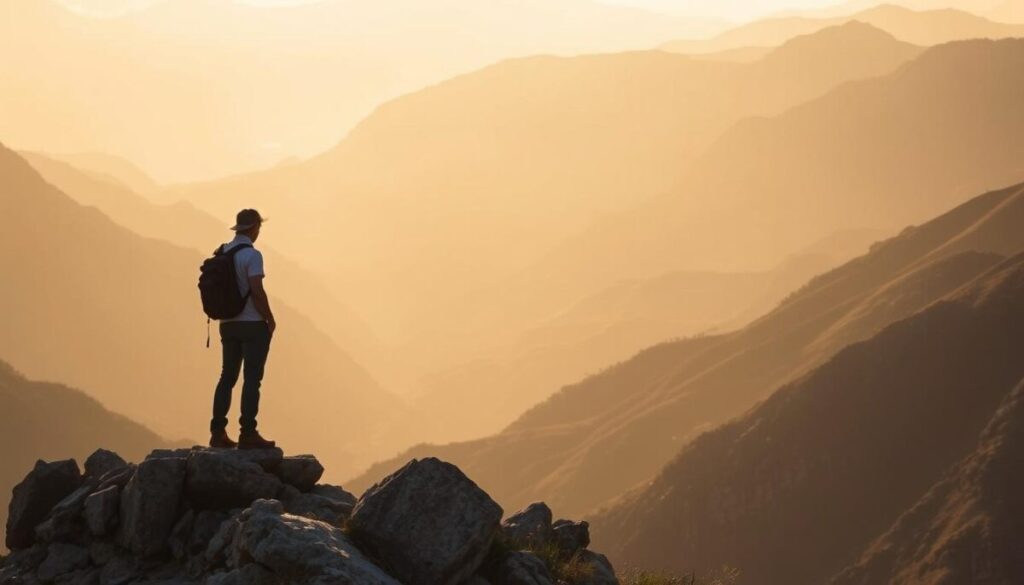
Solo travel can change your life by making you step out of your comfort zone. It opens up a world of self-discovery. When you travel alone, you’re not just seeing new places. You’re diving into experiences that help you grow and build confidence.
Why Solo Travel Creates Unique Learning Opportunities
Traveling solo makes you learn in ways you wouldn’t at home. You have to rely on yourself, making decisions and solving problems alone. This builds resilience and adaptability, key for personal growth.
- Develops problem-solving skills through navigating unfamiliar places.
- Enhances decision-making by taking full responsibility for your journey.
- Fosters independence and self-confidence.
How Being Alone in New Environments Accelerates Personal Growth
Being alone in new places pushes you to grow faster. Solo travel makes you meet locals, try new things, and think about your experiences. This helps you find new parts of yourself and understand your limits better.
- Engage with local cultures and communities, broadening your perspective.
- Reflect on your experiences, identifying what you’ve learned about yourself.
- Develop a stronger sense of identity and self-awareness.
As you face the ups and downs of solo travel, you realize it’s not just about where you go. It’s about who you’re becoming. The confidence and growth from solo travel can change your life long after you return.
Self-Reliance: The Foundation of Solo Travel Lessons
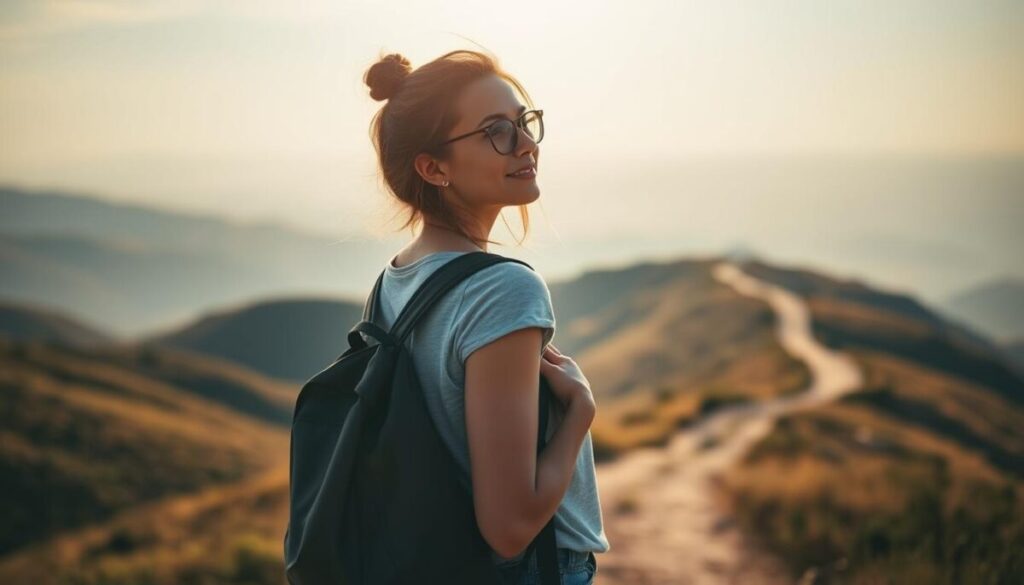
Traveling alone makes you tap into your inner strength, teaching self-reliance. You learn you can do more than you thought. This journey of self-discovery is key to solo travel experiences, making you independent and confident.
Learning to Trust Your Instincts
One big life skill from travel is trusting your instincts. Alone in a new place, you can’t count on others. You must trust your gut and make decisions on your own.
Your instincts will grow sharper as you travel solo. This trust in yourself helps you face tough situations with confidence.
Developing Problem-Solving Skills on the Fly
Solo travel is great for learning to solve problems quickly. You’ll need to think fast and find creative solutions. Whether it’s finding your way or dealing with last-minute changes, you’ll learn to be resourceful.
This skill is valuable long after your trip. It teaches you to be resilient and positive when facing problems.
Becoming Your Own Best Resource
Traveling solo shows you’re your own best resource. You learn to rely on yourself for everything. This self-sufficiency is empowering, making you feel in control.
By being your own best resource, you grow more independent. You can explore new places, talk to locals, and handle tough situations with confidence.
Building Unshakeable Confidence Through Unfamiliar Territories
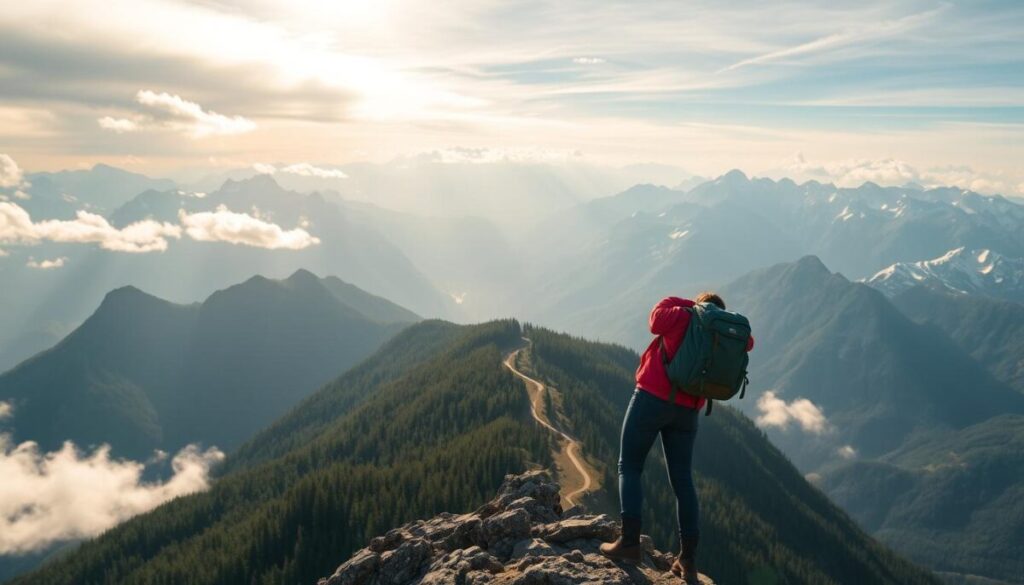
Traveling alone can make you more confident. It’s not just about reaching a new place. It’s about growing and feeling more sure of yourself.
Navigating Foreign Environments Independently
Traveling alone means you face new places alone. This makes you more self-reliant and confident. For example, figuring out a foreign city’s transport or speaking a new language can be tough. But, doing it makes you feel stronger.
You learn to trust your instincts and rely on your problem-solving skills, which are essential for navigating unfamiliar territories.
| Skill Developed | Description | Benefit |
|---|---|---|
| Navigation | Finding your way in new environments | Increased self-reliance |
| Communication | Interacting with locals and other travelers | Enhanced confidence in expressing yourself |
| Problem-solving | Handling unexpected challenges | Improved adaptability and resilience |
Overcoming Travel Challenges and Building Self-Assurance
Solo travel has its challenges, like missed flights or language issues. But, solving these problems makes you more confident. For instance, dealing with a flight delay or bad weather on your own boosts your confidence.
Every challenge you solve shows you can handle uncertainty. This makes you more self-assured.
Transferring Travel Confidence to Everyday Life
The confidence you gain from solo travel applies to more than just travel. It improves your work life, personal relationships, and how you face challenges.
- Increased self-reliance and independence
- Enhanced problem-solving skills
- Greater confidence in navigating new situations
By facing solo travel’s challenges, you become more confident and resilient.
Cultural Intelligence: Understanding and Adapting to Different Worldviews
Solo travel opens doors to cultural intelligence. It lets you grasp and adjust to various worldviews, enriching and changing you. As you explore new places, you’re not just a guest; you’re part of the culture, learning its details.
Developing Empathy Through Cultural Immersion
Immersing yourself in a new culture exposes you to different customs and ways of life. This experience builds empathy by showing you life from different angles. You learn that life isn’t one-size-fits-all, a freeing discovery.
Engaging with locals, trying new foods, and attending cultural events deepen your appreciation for diversity. This empathy is key to interacting well with people from all walks of life.
Learning to Navigate Cultural Differences Respectfully
Understanding cultural differences needs awareness, sensitivity, and respect. Solo travelers learn to respect local customs and traditions. This might mean learning a few phrases, dressing right, or understanding certain practices’ importance.
This approach helps you avoid offense and build real connections. It’s a skill that makes your travels better and stays with you long after.
How Cultural Awareness Enhances Your Worldview
Cultural awareness from solo travel widens your perspective. You encounter new ideas and practices that challenge your views and help you grow. This broader view impacts your work and personal life.
It also makes you consider different viewpoints before deciding. This is a key lesson from solo travel, making you more informed, empathetic, and open-minded.
Communication Skills That Transcend Language Barriers
Traveling alone shows you that communication is more than just words. You can connect with people, even when you don’t speak the same language. This skill makes your travels better and helps you make friends with locals and other travelers.
Non-Verbal Communication Techniques
When you can’t speak the language, non-verbal signs are key. A smile, for example, is understood everywhere. It shows you’re friendly and thankful.
Body language is also important. Being open and friendly can help you connect with locals. For instance, not crossing your arms makes you seem more welcoming.
Basic Language Learning Strategies for Travelers
Learning a few basic words in the local language helps a lot. Saying “hello,” “thank you,” and “excuse me” shows respect for the culture.
Use apps or phrasebooks to learn these words. Practice every day to get better. Ask locals to help with your pronunciation. This improves your skills and shows you’re eager to learn and connect.
“The limits of my language are the limits of my world.”
Building Connections Despite Communication Challenges
Connecting with others while traveling solo is more than just speaking the same language. It’s about being open to new things and people. Use apps or dictionaries, but also be patient and understanding when things get mixed up.
Join local events or group tours to meet others. These shared experiences can help you bond, even if you don’t speak the same language.
- Be open-minded and receptive to new cultures and experiences.
- Use technology to your advantage, such as translation apps.
- Engage in local activities to meet new people.
By using these strategies, you can improve your communication skills. This makes your solo travels richer and helps those you meet.
Financial Management: Budgeting and Resource Allocation on the Road
Traveling solo teaches you how to manage your money. This means making a budget and sticking to it. Good financial planning makes your trip stress-free and fun.
Creating and Sticking to a Travel Budget
First, figure out your daily costs like where you’ll stay, eat, and what you’ll do. Use apps or spreadsheets to keep track of your spending. Also, save some money for surprises.
For example, a solo traveler in Europe might spend $50 a day on food and lodging. Staying within this budget lets you enjoy your trip without worrying about money.
“The best way to know the money is to earn it, and the best way to earn money is to travel.”
This quote shows how important managing your money is when you travel.
Prioritizing Experiences Within Financial Constraints
Traveling solo means you can choose how to spend your money. You might want to try new foods, see historical sites, or do adventurous things. Spending your money wisely makes your trip better.
- Decide what you must do and spend on those things first.
- Look for cheaper options, like free tours or local markets.
- Be open to changing your plans if you find a better deal or save money.
| Activity | Cost | Priority |
|---|---|---|
| Guided Tour | $50 | High |
| Local Cuisine | $20 | Medium |
| Free Walking Tour | $0 | Low |
Money Lessons That Follow You Home
The money skills you learn while traveling solo are useful at home too. You’ll get better at spending wisely, managing your money, and making smart financial choices.
Thinking about your travels, you’ll see these skills are not just for travel. The discipline and resourcefulness you’ve developed will stay with you long after your trip is over.
By being mindful of your money while traveling solo, you make your trip better. You also gain skills that help you in life long after you return.
Lessons From Solo Travel That Transform Your Perspective
Going solo on a trip opens your eyes to new things. You see the world in a fresh way when you travel alone.
Embracing Uncertainty as a Path to Growth
Solo travel teaches you to love the unknown. You learn to step out of your comfort zone and adjust to new places. This skill is key in today’s quick-changing world.
Finding Comfort in Solitude
Traveling alone lets you enjoy your own company. You can think deeply without distractions. This helps you understand yourself better.
Recognizing Your Adaptability and Resilience
Solo travelers face tough challenges. But, they learn to overcome them. This builds your confidence and shows you can handle tough times, making you more independent.
| Skills Developed | Description | Benefit |
|---|---|---|
| Adaptability | Ability to adjust to new environments | Enhanced resilience |
| Self-reliance | Trusting your instincts and decisions | Increased confidence |
| Cultural awareness | Understanding different cultures | Broadened perspective |
Looking back on your solo travels, you’ll see how it changed you. You’re now more open to new things and more confident in exploring the world.
Social Skills and Relationship Building While Traveling Alone
Starting your solo travel journey opens up a world of opportunities. You’ll learn to connect with people from all walks of life. Whether you’re in hostels, on group tours, or just chatting with locals, solo travel boosts your social skills.
Making Meaningful Connections on the Road
Solo travel makes it easy to meet new people. Travelers and locals often bond with solo adventurers. You might share stories and form deep connections, crossing cultural and language barriers.
These connections are rewarding, giving you a peek into different cultures. Hostels, for example, are great for meeting fellow travelers and sharing tips. You’ll gain cultural awareness from solo travel, learning about various customs and traditions.
“The world is a book, and those who do not travel read only one page.” – Saint Augustine
Balancing Solitude and Social Interaction
Solo travel offers chances to socialize, but also to enjoy alone time. Taking breaks helps you recharge and avoid feeling overwhelmed. This balance is key for your emotional well-being and the emotional benefits of solo travel.
By mixing solitude with socializing, you grow both personally and in your relationships. This balance boosts your solo travel and self confidence, helping you navigate social situations and trust yourself.
| Benefits | Solo Travel | Group Travel |
|---|---|---|
| Social Opportunities | High | Medium |
| Personal Growth | High | Medium |
| Cultural Immersion | High | Medium |
How Solo Travel Enhances Your Ability to Form Authentic Relationships
Solo travel teaches you to be open, adaptable, and empathetic. As you explore new places and meet people, you build trust in yourself and others. This trust is essential for forming lasting, meaningful relationships.
Also, facing challenges while traveling solo can create a sense of unity with others who’ve had similar experiences. Sharing these stories can deepen connections, laying the groundwork for genuine relationships.
In summary, solo travel is a powerful way to improve your social skills and build meaningful connections. By embracing solo travel’s opportunities and challenges, you can enhance your ability to form authentic relationships and gain a deeper understanding of yourself and the world.
Practical Life Skills Developed Through Independent Travel
Solo travel helps you grow by teaching you important life skills. You learn to find your way in new places, manage your time well, and keep yourself safe. These skills help you grow personally and become more independent.
Navigation and Spatial Awareness
Traveling alone teaches you how to navigate and understand spaces. You get better at reading maps and using local transport. This skill is useful not just while traveling but also in everyday life, like finding your way in new cities.
Time Management and Planning
Traveling alone means you have to plan and manage your time well. You need to make a schedule, book places to stay, and keep track of your money. This teaches you to be responsible and focus on what’s important.
| Skill | Description | Benefit |
|---|---|---|
| Navigation | Reading maps and understanding local transportation | Enhanced spatial awareness and independence |
| Time Management | Planning itinerary and managing budget | Improved responsibility and task prioritization |
| Health and Safety | Prioritizing health and safety measures | Reduced risk and increased confidence |
Health and Safety Self-Management
Traveling alone makes you more aware of your health and safety. You learn to take care of yourself by researching safe places, keeping an eye on your things, and eating well. This helps you develop good habits and stay safe.
By learning these skills through solo travel, you become more confident and self-sufficient. These skills not only make your travels better but also improve your daily life.
Self-Discovery: Understanding Your True Preferences and Boundaries
Traveling solo is more than seeing new places. It’s a journey of self-discovery. You learn what you really like and what you stand for. Exploring alone makes you look inside and find what truly makes you happy.
Identifying Your Authentic Interests Without External Influence
Traveling alone lets you find what you really love without others’ opinions. When you’re with friends, you might follow their plans. But solo, you can do what you want, without saying yes to others.
This freedom lets you explore your passions fully. You can try new foods, see old sites, or just enjoy nature. Solo travel helps you find what you truly enjoy.
Recognizing Personal Limits and When to Push Beyond Them
Traveling alone also teaches you about your limits. You face new challenges and decide if you can handle them. This helps you grow and learn about yourself.
By facing these challenges, you become stronger and more confident. This growth can help you in many areas of life.
Developing a Stronger Sense of Identity
Traveling alone helps you know yourself better. You learn to trust yourself and make your own decisions. This journey of self-discovery clarifies your values and what you stand for.
As you become more independent, you also grow in confidence. Solo travel is a powerful way to discover yourself and live a more fulfilling life.
Conclusion: Integrating Your Travel Insights Into Everyday Life
Reflecting on your solo travels, you’ll see lessons that go beyond the trip. Solo travel teaches you about personal growth and self-awareness. These skills can improve your daily life.
At first, solo travel might seem scary. But, trying it once can change your life. It makes you more confident and aware of different cultures. You’ll learn to face new challenges and see the world in a new light.
Using what you learned from solo travel can make your life better. So, why not start a solo journey? You might be amazed at how it can improve your life.
FAQ
What are the benefits of solo travel?
How does solo travel help build confidence?
What skills do you gain from solo travel?
How does solo travel facilitate self-discovery?
Can solo travel help with cultural awareness and understanding?
How do solo travelers manage communication challenges?
What are some essential life skills learned from solo travel?
Why is solo travel considered a transformative experience?
Frequently Asked Questions
- Q: What skills do you gain from solo travel?
- A: Solo travel teaches you practical skills like navigation and time management. You also learn about health and safety. Plus, you gain cultural intelligence and financial management skills.
- Q: Why is solo travel considered a transformative experience?
- A: Solo travel challenges your comfort zone and assumptions. It helps you develop new skills and perspectives. Traveling alone offers a fresh view of yourself and the world.
- Q: Why is solo travel considered a transformative experience?
- A: Solo travel challenges your comfort zone and assumptions. It helps you develop new skills and perspectives. Traveling alone offers a fresh view of yourself and the world.
Share :
You Might Also Like



